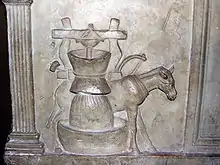Mills of God
The proverbial expression of the mills of God grinding slowly refers to the notion of slow but certain divine retribution.


Plutarch (1st century AD) alludes to the metaphor as a then-current adage in his Moralia (De sera numinis vindicta "On the Delay of Divine Vengeance"):
- "Thus, I do not see what use there is in those mills of the gods said to grind so late as to render punishment hard to be recognized, and to make wickedness fearless."[3]
Plutarch no doubt here makes reference to a hexameter by an unknown poet, cited by sceptic philosopher, Sextus Empiricus (2nd century) in his Adversus Grammaticos as a popular adage:[4]
- Ὀψὲ θεῶν ἀλέουσι μύλοι, ἀλέουσι δὲ λεπτά.
- "The millstones of the gods grind late, but they grind fine."[5]
The same expression was invoked by Celsus in his (lost) True Discourse. Defending the concept of ancestral fault, Celsus reportedly quoted "a priest of Apollo or of Zeus":
- Ὀψὲ, φησι, θεῶν ἀλέουσι μύλοι, κἆϛ παίδων παῖδας τοί κεν μετόπισθε γένωνται.
- 'The mills of the gods grind slowly', he says, even 'To children's children, and to those who are born after them.'[6]
The Sibylline Oracles (c. 175) have Sed mola postremo pinset divina farinam ("but the divine mill will at last grind the flour").[7]
The proverb was in frequent use in the Protestant Reformation, often in the Latin translation Sero molunt deorum molae due to Erasmus of Rotterdam (Adagia, 1500),[8] but also in German translation.[9]
The expression was anthologised in English translation by George Herbert in his collection of proverbs entitled Jacula Prudentum (1652), as "God's mill grinds slow but sure" (no. 743). German epigrammatist Friedrich von Logau in his Sinngedichte (c. 1654) composed an extended variant of the saying, under the title "Göttliche Rache" (divine retribution),[10]
- Gottes Mühlen mahlen langsam, mahlen aber trefflich klein,
ob aus Langmut er sich säumet, bringt mit Schärf 'er alles ein.
translated into English by Henry Wadsworth Longfellow ("Retribution", Poetic Aphorisms, 1846):[11]
- Though the mills of God grind slowly; Yet they grind exceeding small;
- Though with patience He stands waiting, With exactness grinds He all.
Arthur Conan Doyle alluded to the proverb in his very first Sherlock Holmes adventure, A Study in Scarlet. The allusion is found in the fourth chapter in a scene in which John Ferrier is confronted by two of the Mormon characters:
- . . . Both of them nodded to Ferrier as he entered, and the one in the rocking-chair commenced the conversation.
- “Maybe you don’t know us,” he said. “This here is the son of Elder Drebber, and I’m Joseph Stangerson, who travelled with you in the desert when the Lord stretched out His hand and gathered you into the true fold.”
- “As He will all the nations in His own good time,” said the other in a nasal voice; “He grindeth slowly but exceeding small.” John Ferrier bowed coldly. He had guessed who his visitors were. . . .
Doyle, Arthur Conan, A Study in Scarlet (1886)(emphasis supplied).
The proverb was used by Agatha Christie in her novel Hercule Poirot's Christmas, as a person quoted it when they saw the corpse of a man who had lived an evil life. It was also referred to by W. Somerset Maugham in the novel The Moon and Sixpence wherein it is used, somewhat piously, by a family member to imply a certain justice in the demise of the central character Charles Strickland,
Then I told them what I had learned about Charles Strickland in Tahiti. I thought it unnecessary to say anything of Ata and her boy, but for the rest I was as accurate as I could be. When I had narrated his lamentable death I ceased. For a minute or two we were all silent. Then Robert Strickland struck a match and lit a cigarette. "The mills of God grind slowly, but they grind exceeding small," he said, somewhat impressively.
— W. Somerset Maugham, "The Moon and Sixpence" (1919)
During the Second World War, both Winston Churchill and Franklin Roosevelt quoted Longfellow when promising retribution for the extermination of the Jews.[12]
References
- Urnholder of the miller Publius Nonius Zethus (1st century C.E.), found in Ostia Antica, now in the Museum of the Vatican.
- Rosemary Alicia Brown (1981), Katherine Emma Maltwood (PDF), Victoria: Sono Nice. University of Victoria Art Collections M964.1.357
- A. P. Peabody (1885), Plutarch on the Delay of Divine Justice. Plutarch, Ian Kidd, Robin Waterfield (1992), "On God's Slowness to Punish", Essays, ISBN 9780140445640CS1 maint: multiple names: authors list (link)
- Adversus Mathematicos I Cap. 17 D.L. Blank, trans. (1998) p. 311. John Pairman Brown (1995), Israel and Hellas, 3, ISBN 9783110168822.
- The Greek μύλοι is plural, referring to two grindstones (i.e. quern and handstone) forming a single mill; the Latin translation by Gentian Hervetus (1569) renders this as mola "mill" in the singular: Est mola tarda dei, verum molit illa minutim.
- Gagné, Renaud (2013). Ancestral Fault in Ancient Greece. Cambridge: Cambridge University Press. p. 60. ISBN 978-1-107-03980-3.
- Book 8 verse 15 Sibylline Oracles trans. M. S. Terry (1890) "Late will the mills of God grind the fine flour". On the date of c. AD 175 for book 8, verses 1–216 see: J. J. Collins "Sibylline Oracles (Second Century B.C.–Seventh Century A.D)" in: Charlesworth (ed.), Old Testament Pseudepigrapha, vol. 1, Hendrickson Publishers (1983), 317–472 (here: p. 416).
- Erasmus of Rotterdam, Adagia 3382 (4.4.82) Sero molunt deorum molae: Plutarchus in commentario cui titulus Πέρι τὦν ὑπὸ τοῦ θείου βραδέως τιμωρουμένων : Ὥστε οὐχ ὁρὦ τί χρήσιμον ἔνεστι τοῖς ὀψὲ δὴ τούτοις ἀλεῖν λεγομένοις μύλοις τὦν θεὦν, id est Itaque non video quidnam utilitatis insit istis deorum molis quae sero dicuntur molere. Caeterum ex his quae praecedunt eodem in loco, colligere licet dici solitum de his qui, licet serius, tamen aliquando poenas dant malefactorum vindici deo.
- Early New High German variants: Gots mül steht offt lang stil; Die götter malen oder scheren eim langsam, aber wol. Nina-Maria Klug, Das konfessionelle Flugblatt 1563–1580: Eine Studie zur historischen Semiotik und Textanalyse, volume 112 of Studia Linguistica Germanica, Walter de Gruyter, 2012 p. 189
- "Göttliche Rache", Sinngedichte III, 2, 24.
- Hugh Rawson; Margaret Miner, eds. (2006). "God, 8". The Oxford Dictionary of American Quotations. Oxford: Oxford University Press. p. 289. ISBN 978-0-19-516823-5.
- Nicholson Baker (2012), The Way the World Works, Simon and Schuster, p. 264, ISBN 9781471112836
See also
| Wikiquote has quotations related to: Justice |
| Wikiquote has quotations related to: Retribution |